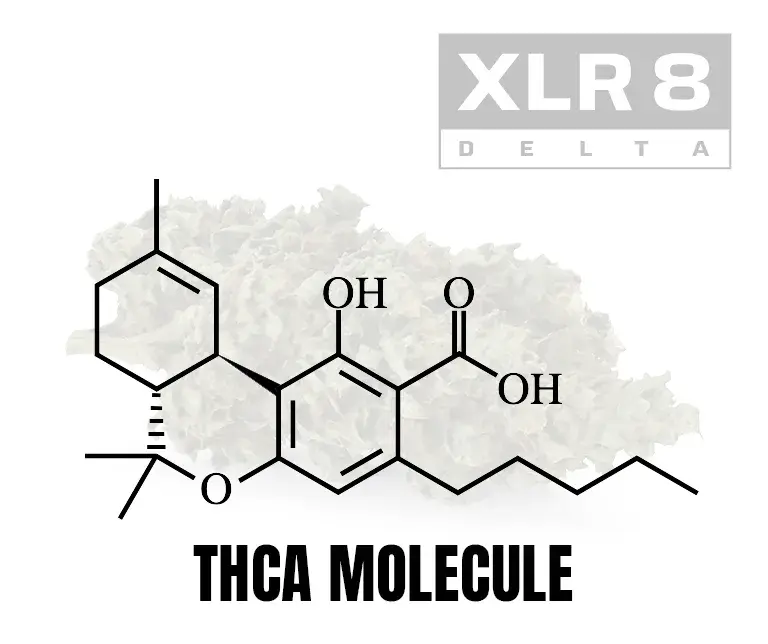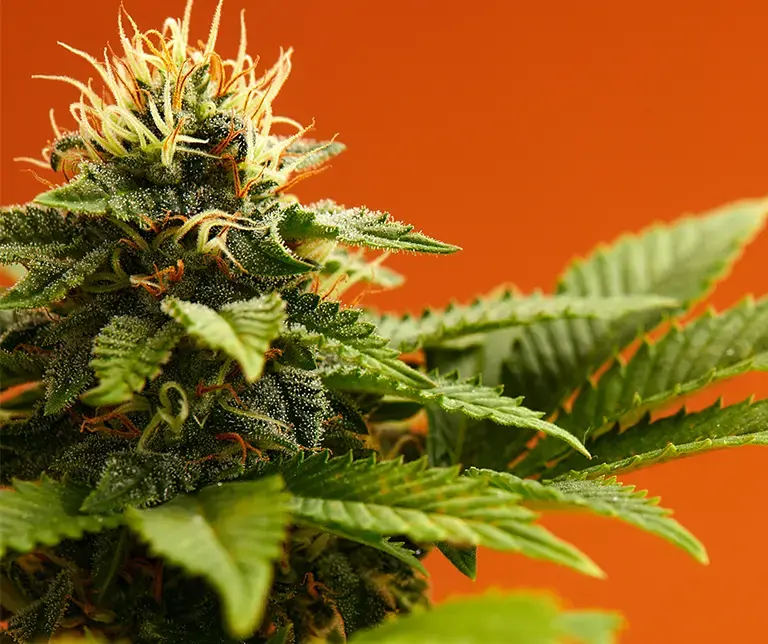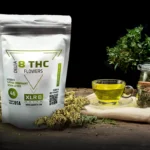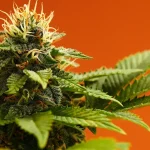Just when you thought you had a handle on the cannabinoid cosmos with THC and CBD, along comes THCA to add a whole new layer of intrigue. If you’ve been delving into the world of cannabinoids, terpenes, and the intricate dance of compounds within cannabis, get ready to expand your knowledge further.
In this blog, we’ll explain THCA, exploring its origins, properties, potential benefits, and how it fits into the broader landscape of CBD consumption. Whether you’re a seasoned hemp enthusiast or someone just starting to explore the expanding world of cannabinoids, learning more about THCA is to your advantage.
Top Potential Benefits of THCA
Anti-Inflammatory Properties
THCA has demonstrated the ability to reduce inflammation, which is particularly advantageous for individuals suffering from inflammatory conditions like arthritis. Inflammation is a biological response to harmful stimuli. While it is a natural part of the healing process, extreme inflammation can lead to various health issues, including persistent pain and tissue damage.
- Pain alleviation
By reducing inflammation, THCA can help alleviate the pain associated with conditions such as arthritis. This can lead to a significant improvement in the quality of life for individuals who suffer from chronic pain due to inflammation.
- Improved Mobility and Function
By reducing inflammation, THCA can help alleviate the pain associated with conditions such as arthritis. This can lead to a significant improvement in the quality of life for individuals who suffer from chronic pain due to inflammation.
- Overall Wellbeing
Beyond physical benefits, the reduction in pain and inflammation can also positively impact mental well-being. Chronic pain often leads to stress, anxiety, and depression. By alleviating these symptoms, THCA may contribute to better mental health and a more positive outlook on life.
Anti-Nausea and Appetite-Stimulating Effects
THCA may also stimulate appetite, which is beneficial for individuals experiencing appetite loss due to various reasons.
For those with eating disorders like anorexia, stimulating appetite can help in maintaining proper nutrition and weight, which is a crucial part of the treatment and recovery process.
Additionally, conditions such as HIV/AIDS, cancer, and other chronic illnesses can lead to significant appetite loss. By stimulating appetite, THCA can help ensure that individuals maintain adequate nutritional intake, which is essential for their overall health and recovery.
Anti-Oxidant and Anti-Cancer Properties
THCA offers notable health benefits due to its antioxidant and potential anticancer properties. As an antioxidant, THCA helps combat oxidative stress, thereby reducing cellular damage, which is crucial for maintaining overall cellular health and preventing various diseases.
Additionally, preliminary research indicates that THCA may have anticancer potential. Although more studies are necessary to fully understand its mechanisms and effectiveness, these properties suggest that THCA could play a significant role in supporting health and potentially combating cancer.
Neuroprotective Effects
THCA may offer neuroprotective benefits, potentially safeguarding brain cells from damage and degeneration. This indicates possible applications in treating neurodegenerative diseases such as Parkinson’s and Alzheimer’s.
By protecting neurons, THCA could help slow the progression of these conditions, preserving cognitive and motor functions for a longer period. These neuroprotective effects suggest that THCA might be a valuable component in future therapeutic strategies aimed at mitigating the impact of neurodegenerative diseases.

What is THCA?
THCA, or tetrahydrocannabinolic acid, is the precursor to THC found in raw cannabis. As the plant matures, it first produces CBGA, known as the “mother of all cannabinoids,” which then breaks down into primary cannabinoids, including THCA and CBDA.
Unlike THC, THCA is non-intoxicating due to an additional molecular carboxyl ring that prevents it from binding to brain receptors responsible for the high. Despite this, THCA is crucial because it eventually converts to THC, providing the psychoactive effects and numerous health benefits associated with cannabis.
How is THCA Converted to THC?
THCA becomes THC through a process called decarboxylation, which involves heating or aging the cannabis plant. When cannabis is harvested, it contains high levels of THCA and little to no THC.
Exposure to heat through smoking, baking, or vaping causes the THCA molecule to lose a carboxyl group, converting it into THC and activating its psychoactive effects, making it more potent and bioavailable.
Decarboxylation can also occur naturally over time as the plant ages and is exposed to sunlight, which is why older cannabis may have higher THC levels. However, overheating can degrade THC into less desirable compounds, while underheating can result in ineffective products with lower THC levels.
THCA vs THC
The primary difference between THCA and THC is that THCA does not produce intoxicating effects, whereas THC does. THCA converts to THC through heating methods like smoking, vaping, dabbing, or cooking, which removes a carboxyl ring and allows THC to bind to CB1 receptors in the body.
Both cannabinoids can treat nausea, but THCA is more effective for inflammation, while THC might be better for sleep. THCA may also have the potential to treat seizure disorders. The choice between THCA and THC depends on individual body chemistry and desired effects.
Additionally, THCA derived from hemp may be the only option for those in states where marijuana is illegal.
THCA Dosage
General Guidelines
THCA products typically come with a recommended dosage chart provided by the manufacturer. This chart helps you start with an “average” amount to experience the desired effects, as the manufacturer understands their product best. For instance, Binoid includes THCA dosing information on all their packaging.
Factors THCA Influencing Dosage
Tolerance to THCA
Individual tolerance to cannabinoids varies based on the endocannabinoid system.
New users generally have low tolerance, requiring lower doses, whereas seasoned users may start with standard doses.
Product Type
Different delivery methods affect the potency, onset, and duration of effects.
Inhalation (smoking/vaping) acts quickly and strongly, edibles offer a gradual onset, tinctures fall in the middle, and dabs (concentrates) are the most potent.
Strain
Strains vary in THC content and potency. Research the strain to dose accordingly.
Other Cannabinoids
Combining THCA with other cannabinoids, especially psychoactive ones, can amplify effects. Adjust the THCA dose if consuming other cannabinoids.
Desired Effects
Personal preferences and desired outcomes affect the dosage. Lower doses provide milder effects, while higher doses, such as from dabbing, lead to stronger experiences.
By considering these factors, you can tailor your appropriate THCA dosage to your specific needs and preferences.
How to Use THCA
THCA (tetrahydrocannabinolic acid) is a non-intoxicating compound found in raw cannabis and hemp plants. It’s the precursor to THC, the psychoactive component in cannabis. When considering different ways to use THCA-infused products, it’s essential to understand how each form works and its potential benefits.
Tinctures
THCA tinctures are liquid extracts typically made by soaking cannabis flowers in a solvent like alcohol or glycerin. Tinctures are usually taken sublingually (under the tongue), where they are absorbed into the bloodstream for faster onset compared to oral ingestion. THCA tinctures may offer benefits such as pain relief, anti-inflammatory effects, and potential neuroprotective properties.
Gummies
THCA-infused gummies are popular among cannabis users who prefer edibles. These are candies infused with THCA extract. They are ingested orally and metabolized through the digestive system. THCA gummies offer a discreet and convenient way to consume THCA, providing longer-lasting effects compared to inhalation methods.
Vapes
THCA vape products come in cartridges or concentrates designed for vaporization. When heated, THCA converts to THC, producing a vapor that can be inhaled. Vaping allows for rapid absorption into the bloodstream, offering quick relief for symptoms such as pain, nausea, or anxiety. However, be cautious about the quality of vape products and potential health risks associated with vaping.
Capsules
THCA capsules contain a measured dose of THCA extract in a gelatin or vegetarian capsule. They are swallowed and metabolized like other oral medications. Capsules provide a precise and convenient way to consume THCA, especially for those who prefer a tasteless and easy-to-dose option.
Flower
THCA-rich cannabis flower refers to strains with high levels of THCA and minimal THC. These flowers can be smoked or vaporized. Smoking or vaping THCA-rich flower allows for immediate effects, making it suitable for managing acute symptoms like pain or nausea. However, smoking may not be ideal for individuals with respiratory issues.
Topicals
THCA-infused topicals include creams, lotions, balms, and oils applied directly to the skin. While THCA doesn’t produce psychoactive effects, it may offer localized relief from pain, inflammation, and skin conditions. Topicals are ideal for targeting specific areas and are non-intoxicating, making them suitable for daytime use.
Isolates
THCA isolates are highly purified forms of THCA, typically in crystalline or powder form. They contain only THCA without other cannabinoids or plant compounds. Isolates can be added to foods, beverages, or homemade products for precise dosing. However, they lack the synergistic effects of whole-plant extracts (entourage effect) found in full-spectrum products.
Frequently Asked Questions
Can drug tests detect THCA?
Drug tests typically target THC (tetrahydrocannabinol), the psychoactive compound in cannabis, rather than THCA (tetrahydrocannabinolic acid), which is non-intoxicating.
However, some drug tests may detect THCA indirectly by measuring THC levels since THCA can convert to THC over time or with heat. It’s essential to be aware of the type of drug test being administered and the specific compounds it targets.
Can THCA make me high?
THCA itself does not produce psychoactive effects or “high” feelings because it is the acidic precursor to THC. THCA needs to undergo decarboxylation, a process that removes a carboxyl group through heat or aging, to convert it into THC and become psychoactive.
Therefore, consuming raw cannabis or THCA-rich products without decarboxylation will not result in a “high.”
How is THCA converted into THC?
THCA converts to THC through a process called decarboxylation. This process can occur naturally over time as cannabis ages, but it’s commonly accelerated through heat, such as smoking, vaping, or cooking cannabis at a certain temperature. Decarboxylation removes the carboxyl group (-COOH) from THCA, transforming it into THC, which is the compound responsible for the psychoactive effects associated with cannabis.
Is THCA legal?
The legal status of THCA varies depending on the jurisdiction and the source of the THCA. In regions where cannabis is legal for medical or recreational use, THCA-rich products may also be legal if they comply with local regulations.
However, it’s essential to differentiate between THCA derived from hemp, which contains less than 0.3% THC (legal under the U.S. federal Farm Bill), and THCA derived from marijuana, which may be subject to stricter regulations. Always check local laws and regulations regarding cannabis and its derivatives to ensure compliance.
Where is the best place to buy THCA?
XLR8 Delta is a reputable online store known for selling federally legal THCA-infused products. They provide Certificates of Analysis (COAs) to prove the potency and purity of their products, ensuring quality and safety. XLR8 Delta offers affordable THCA products without compromising on quality, making them a trusted choice for consumers seeking reliable THCA options.
References:
The Cannabinoids, CBDA and THCA, Rescue Memory Deficits and Reduce Amyloid-Beta and Tau Pathology in an Alzheimer’s Disease-like Mouse Model; Juyong Kim, Pilju Choi, Young-Tae Park, Taejung Kim, Jungyeob Ham, and Jin-Chul Kim (https://www.ncbi.nlm.nih.gov/pmc/articles/PMC10095267/)
Tetrahydrocannabinolic acid reduces nausea-induced conditioned gaping in rats and vomiting in Suncus murinus; E M Rock, R L Kopstick, C L Limebeer, and L A Parker (https://www.ncbi.nlm.nih.gov/pmc/articles/PMC3792001/)
Effects of cannabinoids Δ(9)-tetrahydrocannabinol, Δ(9)-tetrahydrocannabinolic acid and cannabidiol in MPP+ affected murine mesencephalic cultures; Rudolf Moldzio, Thomas Pacher, Christopher Krewenka, Barbara Kranner, Johannes Novak, Johanna Catharina Duvigneau, Wolf-Dieter Rausch (https://pubmed.ncbi.nlm.nih.gov/22571976/)




